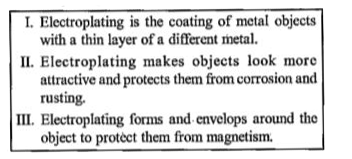Consider the following events for a family with children
A = {Children of both sexes}
B = {At-most one boy}
Then which of the following statements is true?
A and B are independent events if a family has 3 children
A and B are not independent events if a family has 3 children
A and B are not independent events if a family has only 2 children
A and B are independent events if a family has only 2 children
The correct Answer is:A, C
Step by step video, text & image solution for Consider the following events for a family with children A = {Children of both sexes} B = {At-most one boy} Then which of the following statements is true? by Maths experts to help you in doubts & scoring excellent marks in Class 12 exams.
Updated on:21/07/2023Topper's Solved these Questions
- PROBABILITYBook:AAKASH INSTITUTEChapter:PROBABILITYExercise:ASSIGNMENT (SECTION - D Linked Comprehension Type Questions)
Explore 21 Videos
- PROBABILITYBook:AAKASH INSTITUTEChapter:PROBABILITYExercise:ASSIGNMENT SECTION-E (assertion -reason type questions)
Explore 15 Videos
- PROBABILITYBook:AAKASH INSTITUTEChapter:PROBABILITYExercise:ASSIGNMENT (SECTION - B Objective Type Questions (One option is correct))
Explore 65 Videos
- PRINCIPLE OF MATHEMATICAL Book:AAKASH INSTITUTEChapter:PRINCIPLE OF MATHEMATICAL Exercise:Section-D:(Assertion-Reason Type Questions)
Explore 12 Videos
- RELATIONS AND FUNCTIONS Book:AAKASH INSTITUTEChapter:RELATIONS AND FUNCTIONS Exercise:Assignment (Section - J) Aakash Challengers Questions
Explore 8 Videos
Similar Questions
Consider the following events for a family with children A = {of both sexes}; B = {at most one boy} In which of the following (are/is) the events A and B are independent. (a) if a family has 3 children (b) if a family has 2 children Assume that the birth of boy or a girl is equally likely mutually exclusive and exhaustive.
View SolutionConsider the following statements about electroplating

Which one of the above statements is true?
View Solution
Knowledge Check
Let A and B any two events. Which one of the following statements is always true?
AP(A'/B)=P(A/B)BP(A/B)=P(B'/A)CP(A'/B)=1−P(A/B)DP(A'/B)=1−P(A/B')Which of the following statements is not true for both B and Al ?
AThey burn in oxygen to give oxides at high temperatureBTheir halides are Lewis acidsCThey combine with nitrogen to form nitridesDThey react with HCl to from chloridesIf A and B are two events, then which one of the following is/are always true?
AP(A∩B)≥P(A)+P(B)−1BP(A∩B)≤P(A)CP(A'∩B')≥P(A')+P(B')−1DP(A∩B)=P(A)P(B)
Each of the three children in a family is equally likely to be a boy or a girl independent of the others. Define the events E: "all the children in the family are of the same sex F: "there is at most one boy in the family" G: "the family includes a boy and a girl" Then
View SolutionWhich of the following statements about children’s thinking is NOT correct ?
View SolutionWhich ofthe following statements about children's errors is correct ?
View SolutionWhich one of the following statements about children would Vygotsky agree with?
View SolutionWhich of the following statements regarding children and their learning is correct?
View Solution

